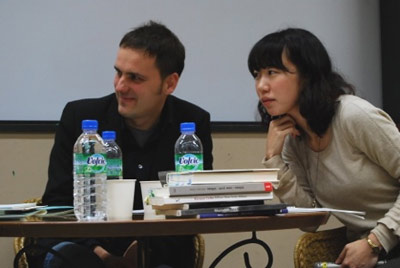basque heritage worldwide

11/27/2012

ADVERTISING
Tokyo, Japan. At the beginning of the month writer Kirmen Uribe toured Japan while presenting his book Bilbao-New York-Bilbao with readings in Tokyo and the island of Okinawa. Uribe counted on the help of Nami Kaneko, the book’s translator, at the readings. Kaneko started to translator the novel directly from Euskera, on her own, so that those around her could read it, thinking that it would be very well understood in Japan. And that is how it went, one of the translations made it to a Japanese publisher and the book was recently published by the prestigious Hakusuisha publisher in Tokyo
“The translation of Bilbao-New York-Bilbao was full of coincidences and this is very interesting because the coincidence is also very present in the book. To tell the truth I was very surprised by the publisher’s decision because besides being very fast, it was surprising to me that t a publisher like Hakusuisha would publish a book by a Basque writer,” Kaneko explained to EuskalKultura.com. “Besides this was the first time that I translated a book, especially from Basque. But I did it out of love for the book so that readers here could also enjoy it.”
Obabakoak as motivation
Nami got to know the Basque culture ten years ago, thanks to a Basque film festival organized in Tokyo in 2003. She was studying Hispanic literature and culture and decided to travel to Euskal Herria on vacation. When she got home, she began to study Basque at the University of Waseda and she read Obabakoak, by Bernardo Atxaga, that same year that had been translated into Japanese.
“Now I know that all of those coincidences marked my life. Since that moment, reading Obabakoak in its original version converted into motivation for me to learn Basque.” Kaneko took a course on Basque language and culture for a year at the University of the Basque Country, and was in a Euskaltegi learning Basque, and today, she is doing her thesis on Basque literature for her doctorate at Tokyo University of Foreign Studies.
The same world
The translator knew that Japanese people would easily identify iwth Uribe’s novel. “Japan is far from the Basque Country geographically, but when reading the novel Japanese readers will realize that we live in very similar worlds. Our culture is also very tied to the sea, and we are also losing old worlds and words, our grandparents lived the war…Kirmen Uribe’s book makes us reflect on those things, and this is really beautiful, because it creates new communication through literature.”
Kaneko thinks that there are several similarities between the Basque and Japanese cultures, aesthetics for example, “Simplicity, above all. And also our languages are similar, without a doubt. Kirmen and I were very surprised at the readings that we gave in Basque and Japanese. Many times the sounds and the rhythms were similar in both languages as well as word order. And that is something that doesn’t happen with Spanish and English.”
Another special moment during the tour was during a meeting with poets on the island of Okinawa. “The language of Okinawa is also a language without a state and with a very rich oral history. But the situation in the Basque Country is much better. Basque is saved, while the languages of Okinawa are in danger of extinction according to UNESCO,” says Nami. “They are very interested in the Basque experience there, especially unifying the dialects. I think that the Basques have a lot to offer because you have overcome many difficulties to save your language and your literature.”
Kaneko concluded noting the importance of sharing the Basque culture in the world. “I am very appreciative of the work done in this sense, for example by the Etxepare Institute. I know that it is difficult to organize readings and publish books abroad, but that is how you sow seeds. I am the fruit of one of those seeds. You never know where you might find more people like me that knew something about the Basque culture and then eight years later ends up as a translator. Translating literature is also very important, because literature unites us. This is what is happening with Kirmen Uribe’s novel in Japan and I am sure that the same will happen in many more places.”
ADVERTISING
ADVERTISING
ADVERTISING
ADVERTISING
ADVERTISING
© 2014 - 2019 Basque Heritage Elkartea
Bera Bera 73
20009 Donostia / San Sebastián
Tel: (+34) 943 316170
Email: info@euskalkultura.eus